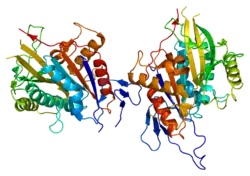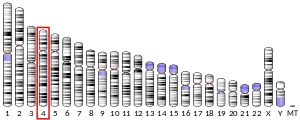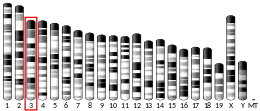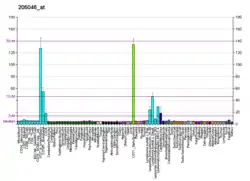Centromere protein E
Centromere-associated protein E is a protein that in humans is encoded by the CENPE gene.[5][6]
Centromere-associated protein E is a kinesin-like motor protein that accumulates in the G2 phase of the cell cycle. Unlike other centromere-associated proteins, it is not present during interphase and first appears at the centromere region of chromosomes during prometaphase. CENPE is proposed to be one of the motors responsible for mammalian chromosome movement and/or spindle elongation.[6]
Clinical significance
Mutations in CENPE result in autosomal recessive primary microcephaly type 13, which includes skeletal abnormalities and immunodeficiency.[7]
References
- GRCh38: Ensembl release 89: ENSG00000138778 - Ensembl, May 2017
- GRCm38: Ensembl release 89: ENSMUSG00000045328 - Ensembl, May 2017
- "Human PubMed Reference:". National Center for Biotechnology Information, U.S. National Library of Medicine.
- "Mouse PubMed Reference:". National Center for Biotechnology Information, U.S. National Library of Medicine.
- Testa JR, Zhou JY, Bell DW, Yen TJ (Mar 1995). "Chromosomal localization of the genes encoding the kinetochore proteins CENPE and CENPF to human chromosomes 4q24→q25 and 1q32→q41, respectively, by fluorescence in situ hybridization". Genomics. 23 (3): 691–3. doi:10.1006/geno.1994.1558. PMID 7851898.
- "Entrez Gene: CENPE centromere protein E, 312kDa".
- "OMIM Entry - # 616051 - MICROCEPHALY 13, PRIMARY, AUTOSOMAL RECESSIVE; MCPH13". www.omim.org. Retrieved 2020-01-25.
Further reading
- Yen TJ, Li G, Schaar BT, et al. (1992). "CENP-E is a putative kinetochore motor that accumulates just before mitosis". Nature. 359 (6395): 536–9. doi:10.1038/359536a0. PMID 1406971. S2CID 4306312.
- Yen TJ, Compton DA, Wise D, et al. (1991). "CENP-E, a novel human centromere-associated protein required for progression from metaphase to anaphase". EMBO J. 10 (5): 1245–54. doi:10.1002/j.1460-2075.1991.tb08066.x. PMC 452779. PMID 2022189.
- Thrower DA, Jordan MA, Schaar BT, et al. (1995). "Mitotic HeLa cells contain a CENP-E-associated minus end-directed microtubule motor". EMBO J. 14 (5): 918–26. doi:10.1002/j.1460-2075.1995.tb07073.x. PMC 398164. PMID 7889940.
- Wood KW, Sakowicz R, Goldstein LS, Cleveland DW (1997). "CENP-E is a plus end-directed kinetochore motor required for metaphase chromosome alignment". Cell. 91 (3): 357–66. doi:10.1016/S0092-8674(00)80419-5. PMID 9363944. S2CID 12216144.
- Cooke CA, Schaar B, Yen TJ, Earnshaw WC (1998). "Localization of CENP-E in the fibrous corona and outer plate of mammalian kinetochores from prometaphase through anaphase". Chromosoma. 106 (7): 446–55. doi:10.1007/s004120050266. PMID 9391217. S2CID 18884489.
- Zecevic M, Catling AD, Eblen ST, et al. (1998). "Active MAP kinase in mitosis: localization at kinetochores and association with the motor protein CENP-E". J. Cell Biol. 142 (6): 1547–58. doi:10.1083/jcb.142.6.1547. PMC 2141767. PMID 9744883.
- Chan GK, Schaar BT, Yen TJ (1998). "Characterization of the kinetochore binding domain of CENP-E reveals interactions with the kinetochore proteins CENP-F and hBUBR1". J. Cell Biol. 143 (1): 49–63. doi:10.1083/jcb.143.1.49. PMC 2132809. PMID 9763420.
- Chan GK, Jablonski SA, Sudakin V, et al. (1999). "Human BUBR1 is a mitotic checkpoint kinase that monitors CENP-E functions at kinetochores and binds the cyclosome/APC". J. Cell Biol. 146 (5): 941–54. doi:10.1083/jcb.146.5.941. PMC 2169490. PMID 10477750.
- Ashar HR, James L, Gray K, et al. (2000). "Farnesyl transferase inhibitors block the farnesylation of CENP-E and CENP-F and alter the association of CENP-E with the microtubules". J. Biol. Chem. 275 (39): 30451–7. doi:10.1074/jbc.M003469200. PMID 10852915.
- Uren AG, Wong L, Pakusch M, et al. (2001). "Survivin and the inner centromere protein INCENP show similar cell-cycle localization and gene knockout phenotype". Curr. Biol. 10 (21): 1319–28. doi:10.1016/S0960-9822(00)00769-7. PMID 11084331. S2CID 18455745.
- Suzuki Y, Tsunoda T, Sese J, et al. (2001). "Identification and characterization of the potential promoter regions of 1031 kinds of human genes". Genome Res. 11 (5): 677–84. doi:10.1101/gr.gr-1640r. PMC 311086. PMID 11337467.
- Liu ST, Chan GK, Hittle JC, et al. (2003). "Human MPS1 kinase is required for mitotic arrest induced by the loss of CENP-E from kinetochores". Mol. Biol. Cell. 14 (4): 1638–51. doi:10.1091/mbc.02-05-0074. PMC 153128. PMID 12686615.
- Brandenberger R, Wei H, Zhang S, et al. (2005). "Transcriptome characterization elucidates signaling networks that control human ES cell growth and differentiation". Nat. Biotechnol. 22 (6): 707–16. doi:10.1038/nbt971. PMID 15146197. S2CID 27764390.
- Garcia-Saez I, Blot D, Kahn R, Kozielski F (2005). "Crystallization and preliminary crystallographic analysis of the motor domain of human kinetochore-associated protein CENP-E using an automated crystallization procedure". Acta Crystallogr. D. 60 (Pt 6): 1158–60. doi:10.1107/S0907444904009564. PMID 15159587.
- Tanudji M, Shoemaker J, L'Italien L, et al. (2005). "Gene silencing of CENP-E by small interfering RNA in HeLa cells leads to missegregation of chromosomes after a mitotic delay". Mol. Biol. Cell. 15 (8): 3771–81. doi:10.1091/mbc.E03-07-0482. PMC 491836. PMID 15181147.
- Garcia-Saez I, Yen T, Wade RH, Kozielski F (2004). "Crystal structure of the motor domain of the human kinetochore protein CENP-E". J. Mol. Biol. 340 (5): 1107–16. doi:10.1016/j.jmb.2004.05.053. PMID 15236970.
- Kurasawa Y, Earnshaw WC, Mochizuki Y, et al. (2005). "Essential roles of KIF4 and its binding partner PRC1 in organized central spindle midzone formation". EMBO J. 23 (16): 3237–48. doi:10.1038/sj.emboj.7600347. PMC 514520. PMID 15297875.
- Mao Y, Desai A, Cleveland DW (2005). "Microtubule capture by CENP-E silences BubR1-dependent mitotic checkpoint signaling". J. Cell Biol. 170 (6): 873–80. doi:10.1083/jcb.200505040. PMC 2171436. PMID 16144904.
- Nousiainen M, Silljé HH, Sauer G, et al. (2006). "Phosphoproteome analysis of the human mitotic spindle". Proc. Natl. Acad. Sci. U.S.A. 103 (14): 5391–6. doi:10.1073/pnas.0507066103. PMC 1459365. PMID 16565220.
This article is issued from Wikipedia. The text is licensed under Creative Commons - Attribution - Sharealike. Additional terms may apply for the media files.







